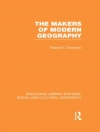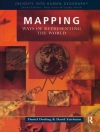‘A comprehensive reader for my political geography course. Good summaries at the end, and articles include effective case study examples.’
– Rachel Paul, Western Washington University
‘A very useful and comprehensive introduction to key concepts in political geography. This book provides useful context not just for ′traditional′ political geography modules, but also those examining broader issues of power, resistance and social movements.’
– Gavin Brown, University of Leicester
‘Vital for introducing basic concepts and terminology in a clear and concise fashion. The short chapters are accessible and well supplemented with pertinent examples.’
– Daniel Hammett, Sheffield University
‘I found the book to be very useful in a supplemental capacity, full of information that would be useful for an undergraduate or early graduate student.’
– Jason Dittmer, University College London
- An introductory chapter providing a succinct overview of the recent developments in the field
- Over 20 key concept entries covering the expected staples of the sub-discipline, such as nationalism, territoriality, scale and political-economy, as well as relatively new arrivals to the field including the other, anti-statism, gender, and post-conflict
- A glossary, figures, diagrams and further reading.
It is essential reading for undergraduate and postgraduate students of political geography.
Table of Content
Introduction
PART ONE: CONCEPTS OF STATECRAFT
Introduction to Section
Nation State
Sovereignty
Governance
Democracy
PART TWO: MODES OF POWER
Introduction to Section
Hegemony
Territory
Geopolitics
Superpower
PART THREE: MODERNITY
Introduction to Section
Colonialism/Imperialism
Political Economy
Ideology
Socialism
Neo-Liberalism
Globalization
Migration
PART FOUR: CONNECTIONS AND RUPTURES IN, BETWEEN AND ACROSS POLITICAL SPACE
Introduction to Section
Scale
Border
Regionalism
PART FIVE: VIOLENCE
Introduction to Section
Conflict
Post-Conflict
Terrorism
Anti-Statism
PART SIX: IDENTITY
Introduction to Section
Nationalism
Citizenship
Post-Colonialism
Representation
Gender
The Other
About the author
Mary Gilmartin is a Professor of Geography at Maynooth University. Her research examines migration with a particular focus on contemporary Irish migration and mobility. She has published widely on migration within the discipline of geography, and previous research projects have been funded by organisations such as the Irish Research Council and the Irish Human Rights and Equality Commission. She was previously Managing Editor of Social and Cultural Geography, the leading international geography journal, and remains a member of the editorial board.












